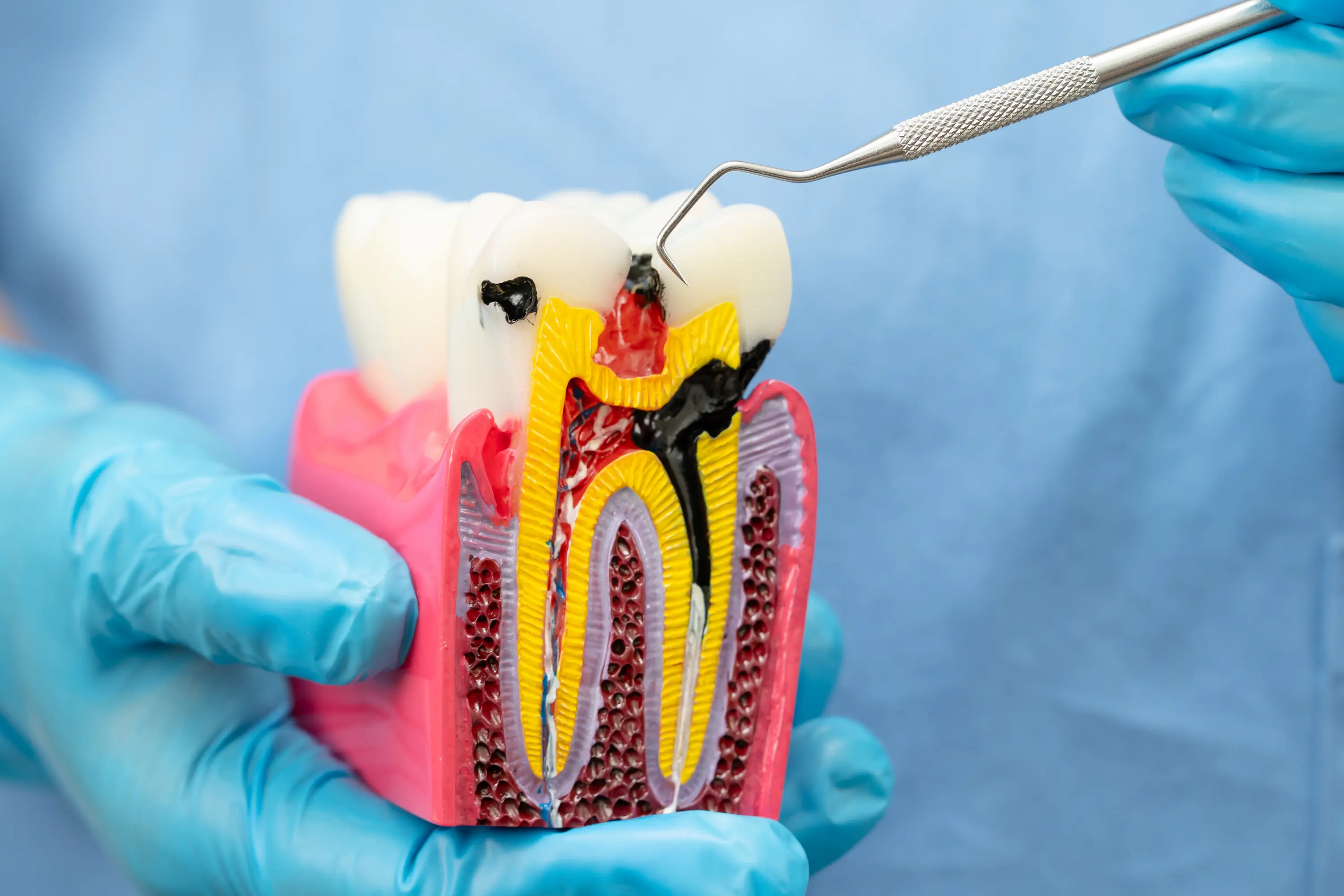Tooth pain hits different. It's sharp, deep, and often impossible to ignore. People describe it as shooting, throbbing, or pulsing like a drum in their head. One of the most common questions dentists get is how to stop the pain immediately and whether there's a way to kill the nerve causing it.
Before trying anything, it helps to understand what's behind that pain. The nerve inside a tooth is part of the pulp, the soft center that keeps the tooth alive. When that pulp gets irritated, inflamed, or infected, you feel it fast. It can come from decay, a crack, trauma, or an untreated cavity. In severe cases, it keeps you awake at night or makes it painful to chew, drink, or even breathe through your mouth.
You might be searching for a quick fix. But not all home remedies are safe. Let's go through what actually helps, what to avoid, and how to deal with the root cause.
What Causes Tooth Nerve Pain?

Model of tooth with nerve pain and cavities
How Cavities Expose Tooth Nerves and Cause Pain
Tooth nerves sit deep inside the tooth, protected by layers of enamel and dentin. When decay or injury breaks through those layers, the nerve gets exposed or irritated, often causing intense pain.
Common causes include:
- Deep cavities that reach the nerve
- Cracks or fractures in the tooth
- Dental trauma from injury or grinding
- Gum infections that spread to the root
- Failed or old fillings
- Worn down enamel from acid or overbrushing
Once the nerve is inflamed, even small things like temperature or pressure can trigger sharp pain. Cold drinks, hot food, or air hitting the tooth might feel unbearable. The pain doesn't always go away on its own.
What People Try (and Why Most Don't Work)
Why Most Home Remedies Don't Stop Tooth Nerve Pain
There are dozens of home remedies floating around the internet. Some are harmless. Others can actually make things worse. Let's look at a few popular suggestions:
Salt water rinse: This helps reduce bacteria and soothes the area. It won't kill the nerve, but it might take the edge off.
Hydrogen peroxide rinse: This should never be used straight. It can burn tissue and worsen pain if misused. It's not a safe way to treat tooth pain at home.
Ice packs: Useful for numbing the area externally. They reduce inflammation around the jaw but don't reach the tooth nerve itself.
Clove oil: This is one of the few remedies that has real effect. Clove oil contains eugenol, a natural anesthetic. You can apply a drop to the painful tooth using a cotton swab. It numbs the area temporarily. But again, it's not permanent.
Alcohol or aspirin applied to the tooth: Don't do this. It can damage the gum tissue and cause chemical burns. Swallowing alcohol or crushing aspirin near your gums is not a treatment.
What Can Kill the Tooth Nerve?
Why You Can't Kill a Tooth Nerve in 3 Seconds at Home
Hate to break it to you, but there is no home method that can safely kill a tooth nerve in three seconds. The idea sounds good when you're in pain, but there's no shortcut that works like that without damage.
To actually stop nerve pain for good, the source of the pain needs to be removed or the nerve needs to be professionally treated.
How Dentists Permanently Stop Tooth Nerve Pain
This means one of three options:
- Removing decay or infection with a dental filling
- Performing a root canal to remove the nerve
- Extracting the tooth entirely if it's beyond repair
All three are done by a dentist, not at home. They're safe, effective, and done with proper numbing and sterilization.
What Can You Do Right Now for Immediate Relief?
While you wait for a dental visit, you can manage the pain at home. These steps are safe and often help reduce the worst of it.
- Rinse your mouth with warm salt water (a teaspoon of salt in a cup of water)
- Take over the counter pain relievers like ibuprofen and tylenol together (if you're not allergic, this works wonders)
- Apply a cold compress to the outside of your cheek for 15 minutes at a time
- If you have clove oil, apply a small amount to the sore area

Clove essential oil still life used help with reducing nerve pain
Avoid chewing on the sore side. Don't eat or drink anything too hot or cold. Stick with soft, bland foods. If the pain is spreading, waking you up at night, or making it hard to eat, that's a sign of a deeper infection. You'll need to get to a dentist as soon as possible.
Why You Shouldn't Wait
How Delayed Treatment Makes Tooth Pain Worse
Tooth nerve pain rarely improves permanently without treatment. Even if the pain stops on its own, that doesn't mean the issue has resolved. A sudden end to pain can happen when the nerve inside the tooth dies, but the infection may still be active. That lingering infection can lead to swelling, pus buildup, and more serious complications.
Delaying treatment often turns a small fix into a much bigger one. A cavity that could have been handled with a filling may end up needing a root canal. In some cases, the damage becomes too severe, and the tooth can't be saved.
Acting early helps avoid emergency situations and reduces the risk of losing the tooth entirely. Getting the source of the pain checked sooner makes treatment easier, faster, and more predictable.
Can a Root Canal Really Fix my Tooth Nerve Pain?
How Root Canal Treatment Eliminates Tooth Nerve Pain
Yes. A root Canal removes the infected or inflamed nerve tissue from inside the tooth. The space is then cleaned, disinfected, and filled. You keep your tooth, but it no longer has a nerve. That means no more pain.
Root canals are not as scary as people think. Modern tools and anesthetics make them smooth and fairly quick. Most people feel much better immediately after the procedure.
If the tooth can't be saved, an extraction is the next step. But dentists try to save natural teeth when possible because they function and feel better than artificial replacements.
How to Avoid Nerve Pain in the First Place
Best Ways to Prevent Tooth Nerve Pain and Sensitivity
Prevention really does work with tooth pain. Keep up with brushing and flossing twice a day. Use fluoride toothpaste to strengthen enamel and reduce decay. Avoid snacking on sugary or acidic foods too often.
Regular checkups allow dentists to catch small problems before they become painful. X-rays can spot decay early, and cleanings remove plaque that leads to infection.
If you grind your teeth, talk to your dentist about getting a night guard. That can protect the enamel and reduce your risk of fractures or nerve exposure.
Signs that the Pain is Serious
When to Seek Emergency Dental Care for Tooth Pain
Some nerve pain is mild and fades within a day. But if it gets worse or keeps coming back, it usually means something more serious is going on. Signs that you should get help immediately include:
- Pain that gets worse when lying down
- Swelling in the gums or face
- Fever or general feeling of illness
- Bad taste or smell in your mouth
- Sensitivity that lasts long after eating or drinking
- Sharp or deep throbbing pain that won't go away
These symptoms suggest the nerve is infected and possibly dying. Once infection reaches this stage, only professional treatment can fix it.
How Dental Abscesses Form and Why They're Dangerous
Waiting too long can lead to an abscess. This is a pocket of pus caused by infection. Abscesses can grow fast, spread to other parts of the body, and become dangerous. They also hurt and a lot. Treating them early means less damage, less cost, and faster recovery.
Can a Tooth Nerve Heal Naturally?
When Tooth Nerve Pain Might Go Away on Its Own
In some very mild cases, the inflammation in the nerve may calm down if the irritant is removed early. That could happen if there's a small area of decay or minor trauma, and you get treatment fast. But once a nerve becomes inflamed past a certain point, it can't heal on its own.
Pain that comes and goes, especially sharp pain, usually means the nerve is in distress. This is not something the body can fix without help. Even if pain goes away, the problem might still be hiding under the surface. That's why it's a mistake to assume everything is fine just because the symptoms stop.
Common Myths About Killing Tooth Pain Fast
Why DIY Tooth Extractions Are Dangerous
"Just pop the tooth out at home."
Trying to pull a tooth on your own is extremely dangerous. It can lead to infection, severe bleeding, and permanent damage. Plus, you probably won't remove the whole root, which causes more problems later.
Why Antibiotics Alone Won't Fix Tooth Nerve Pain
"If I take antibiotics, the pain will go away."
Antibiotics don't kill nerve pain or fix decay. They reduce bacterial infection, but they don't touch the root cause. Pain might go down for a bit, but it will return unless the tooth is treated.
Why "Wait and See" Is the Wrong Approach for Tooth Pain
"I'll wait and see if it gets worse."
By the time the pain gets worse, it's often an emergency. Early treatment is faster, easier, and far more comfortable.
What a Dentist Does to Stop Nerve Pain
How Dentists Diagnose the Cause of Tooth Nerve Pain
At the clinic, a dentist starts with a detailed exam. That includes checking your symptoms, tapping on the tooth, taking x-rays, and checking how the tooth reacts to cold or pressure.

Professional dental treatments for nerve pain include thorough examination, fillings, root canals, or extraction depending on severity
Professional Treatments for Severe Tooth Nerve Pain
If decay or damage has reached the pulp, the next step is to remove the infection. That's done through one of three methods:
- Filling if the damage is small and hasn't reached the nerve deeply
- Root canal if the pulp is infected or inflamed
- Extraction if the tooth can't be saved
Modern dental work is quick and mostly painless. Numbing agents make the procedure comfortable, and recovery is usually smooth with proper aftercare.
What Happens After the Nerve Is Removed?
Life After Root Canal: What to Expect
After a root canal, the nerve is gone. That means you'll no longer feel pain in that tooth, but the tooth still works for chewing and smiling. To protect it long term, the tooth is usually covered with a crown. That restores strength and keeps bacteria out.
The tooth is still alive in the sense that it sits in bone and functions like normal. You just don't feel hot or cold from that tooth anymore.
Tooth Replacement Options After Extraction
If the tooth is extracted, you'll want to think about replacement options. Gaps in your smile can cause shifting of nearby teeth. Dental implants, bridges, or partial dentures are common solutions.
Your dentist can walk you through what's best based on your goals, budget, and oral health.
Long Term Tips for a Pain Free Mouth
Daily Habits That Protect Against Tooth Nerve Pain
Keeping your teeth healthy means fewer surprises and less pain. The most important habits include:
- Brush twice daily for two full minutes using fluoride toothpaste
- Floss once a day to remove plaque between teeth
- Avoid snacking on sweets or acidic drinks throughout the day
- Stay on top of regular cleanings and checkups
If you're prone to decay, consider mouth rinses with fluoride or a prescription-strength toothpaste. Your dentist can help you decide if those are right for you.
How Night Guards Prevent Tooth Nerve Damage
Grinding your teeth can lead to cracks, chips, and worn down enamel. If you notice tightness in your jaw or wake up with sore muscles, a custom night guard might help protect your enamel.
Nerve Pain and Sleep Disruption
Why Tooth Pain Gets Worse When You Lie Down
Tooth pain often gets worse at night. This happens because blood flow to your head increases when you lie down, which puts more pressure on inflamed nerves. It's also when distractions are gone and the pain becomes more noticeable.
How to Sleep Better with Tooth Nerve Pain
Sleeping with your head elevated can reduce the throbbing. Using an extra pillow may help decrease pressure in your face and jaw. Applying a cold pack before bed can also reduce swelling and make it easier to rest.
If sleep is being affected for more than a night or two, it usually means the problem is deeper than a sore gum or surface level issue.
Can Dental Nerves Die?
How Tooth Nerves Die and What Happens Next
Yes, they can. A nerve inside a tooth can die slowly over time if decay or injury cuts off its blood supply. At first, the nerve becomes inflamed. Then it can become necrotic, which means the tissue dies.
When this happens, pain might stop temporarily. But that doesn't mean things are better. A dead nerve is often followed by infection, swelling, and eventually an abscess. That's why pain that vanishes suddenly shouldn't be ignored.
Dead nerves can lead to serious infections in the jaw or face if not treated. Even if the tooth looks fine from the outside, internal damage might still be happening.
What Happens If You Don't Treat It?
Complications of Untreated Tooth Nerve Pain
Leaving a tooth nerve issue untreated doesn't make it disappear. Infection can spread to surrounding tissue, bone, and even other parts of your body. In severe cases, this can turn into a medical emergency.
Untreated decay continues to eat away at the tooth. Eventually, the structure becomes too weak to restore. This means a root canal might no longer be enough, and removal becomes the only choice.
Bone loss can also occur around the roots, which makes replacement with a dental implant more difficult later on.
Can You Lose a Tooth Because of Nerve Pain?
When Nerve Damage Leads to Tooth Loss
Yes. If nerve pain is caused by deep decay or a crack that extends below the gum line, saving the tooth might not be possible. This depends on how much of the structure is still intact and whether infection has damaged the surrounding bone.
That's why early treatment is always better. Small cavities turn into big problems if they aren't addressed quickly. When a nerve gets involved, the clock starts ticking on how long the tooth can be saved.
Psychological Effects of Chronic Tooth Pain
How Tooth Pain Affects Your Mental Health

Take care of your teeth to avoid dealing with nerve pain
Constant pain wears people down. It's not just a physical issue, it can affect your mood, sleep, ability to focus, and even how you eat. Some people start avoiding certain foods or chew only on one side of their mouth.
Chronic nerve pain can make you feel anxious or irritable. It's frustrating when the pain keeps coming back, especially if you haven't found clear answers yet.
That's why education and prompt care matter. Knowing what's happening and how to treat it gives back a sense of control.
How Tooth Structure Affects Pain
Why Different Teeth Hurt in Different Ways
Not every tooth responds the same way to decay or trauma. Molars have more roots and larger pulps, which can make nerve pain more intense. Front teeth are smaller but still sensitive when the nerve is exposed.
The location of the damage matters too. Pain in a top molar can sometimes feel like it's coming from your sinuses or ear. Lower jaw pain might travel down into your neck or cause tension in the jaw joint.
Understanding where the pain starts helps guide treatment. It's also why professional exams and imaging are often needed to pinpoint the source.
Pain After Dental Treatment
Why Your Tooth Might Still Hurt After a Filling
Sometimes teeth feel sore after dental work. That's common if a filling is deep or close to the nerve. The area might be sensitive to pressure or temperature for a few days or even weeks.
This doesn't mean the tooth is doomed. It often settles down with time. But if the pain lingers or gets worse, it could mean the nerve is still irritated or has become inflamed. In that case, follow-up care might be needed.
It's important to let your provider know if symptoms persist after a procedure. Early adjustments or testing can prevent further damage.
Final Thoughts
Tooth nerve pain can be intense, but it's also treatable. Most people get relief quickly once the cause is found. Whether it's a cavity, crack, infection, or inflammation, there's a clear path forward with the right treatment.
Acting early protects your teeth and avoids bigger problems later. It helps preserve the structure, prevent infections, and reduce the chances of losing a tooth.
Being informed helps you make better choices. If you're dealing with nerve pain now or want to avoid it later, taking small steps each day adds up. Contact us if you want to learn more. Good hygiene, regular checkups, and prompt attention to pain can keep your teeth working and pain free for years.





